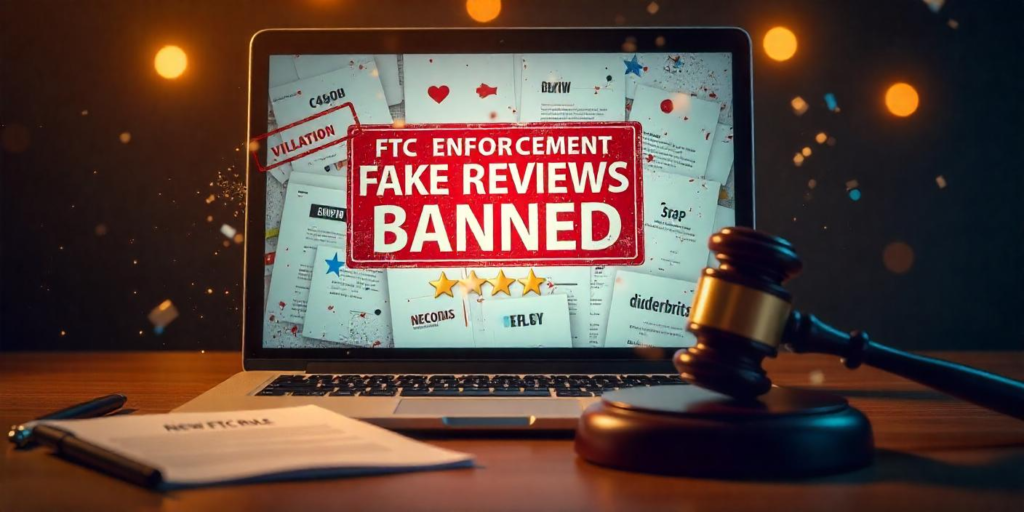Online reviews have become an essential part of consumer decision-making. Whether purchasing a product, selecting a restaurant, or choosing a service provider, people rely heavily on reviews to guide their choices. However, with the increasing prevalence of fake reviews, consumers are at risk of being misled. To tackle this issue, the Federal Trade Commission (FTC) has introduced a new rule that explicitly bans the creation, sale, and dissemination of fake reviews and testimonials.
This landmark decision is set to impact businesses, marketers, and influencers who rely on online reviews for credibility and engagement. Let’s explore what this rule means, how it will be enforced, and what businesses should do to comply.
Understanding the FTC’s New Rule on Fake Reviews
On August 14, 2024, the FTC announced its final rule that aims to prohibit deceptive review practices. This move is part of the agency’s broader strategy to protect consumers from misleading information and maintain transparency in digital marketing. The rule is designed to address the growing problem of fake reviews across platforms like Google, Amazon, Yelp, and Trustpilot.
According to the FTC, businesses can no longer:
- Write or pay for fake reviews from people who haven’t actually used their product or service.
- Suppress negative reviews or manipulate ratings to appear more favorable.
- Use AI-generated reviews that falsely represent real customer feedback.
- Buy fake engagement such as likes, followers, or upvotes to artificially boost credibility.
- Have employees write reviews without disclosure of their affiliation with the company.
- Use misleading review aggregation tactics to deceive consumers.
To read the full official announcement, visit the FTC’s website.
Why the FTC’s Rule Matters
Fake reviews not only deceive customers but also distort fair competition among businesses. Companies that use fraudulent review strategies often outperform honest businesses that rely on genuine feedback. The FTC’s new regulations seek to level the playing field and ensure that consumers make informed decisions based on authentic experiences.
This move comes in response to studies showing that nearly 40% of online reviews are estimated to be fake (Harvard Business Review). Such deceptive practices result in billions of dollars in fraudulent transactions each year, affecting consumer trust across industries.
Recent FTC Actions Against Fake Reviews
The FTC has already taken action against several high-profile companies that engaged in fake review practices. Here are some notable cases:
1. Fashion Nova – Suppressing Negative Reviews
Fashion Nova, a popular fast-fashion retailer, was found guilty of hiding negative reviews from their website. The company only allowed 4-star and 5-star reviews to be publicly visible, misleading customers about their products. As a result, Fashion Nova settled with the FTC for $4.2 million and was required to implement transparent review policies (New York Post).
2. Roomster – Fake Rental Listings
Roomster, an online marketplace for rental properties, was caught paying for thousands of fake positive reviews to lure in potential renters. Many consumers fell victim to fraudulent listings, losing money to scams. The FTC fined Roomster $1.6 million for deceptive advertising practices (The Verge).
3. Amazon’s Fake Review Crackdown
Amazon has also ramped up efforts to combat fake reviews, recently banning over 200,000 fraudulent accounts that were found selling fake reviews in exchange for payment or free products. The company now collaborates with the FTC and consumer protection agencies to monitor and prevent review manipulation (AP News).
The Global Crackdown on Fake Reviews
The fight against fake reviews isn’t limited to the U.S. In the United Kingdom, the Competition and Markets Authority (CMA) has introduced strict regulations that target businesses engaging in deceptive review practices. Companies that violate these rules can face hefty fines and potential legal action (Compliance Week).
Similarly, the European Union (EU) has implemented the Digital Services Act (DSA), which requires online platforms to take proactive measures against fake reviews. Non-compliance can result in fines of up to 6% of a company’s global revenue.
How Businesses Can Stay Compliant
To avoid facing legal consequences and maintain customer trust, businesses should follow these best practices:
1. Encourage Authentic Reviews
Instead of paying for fake reviews, companies should encourage real customers to share their honest experiences. Incentives should be transparent and not conditionally tied to positive feedback.
2. Monitor and Remove Fraudulent Reviews
Businesses should use review monitoring tools like Trustpilot, Yelp, and Google My Business analytics to detect and report suspicious reviews.
3. Be Transparent with Influencers
Any brand partnerships with influencers must include clear disclosures that indicate paid promotions or free product exchanges.
4. Avoid Suppressing Negative Feedback
Instead of deleting or hiding negative reviews, companies should address concerns publicly and use criticism to improve their products and services.
5. Educate Employees and Partners
Ensure that all employees and marketing partners understand the FTC’s new regulations and the consequences of violating them.
Conclusion: The Future of Online Reviews
With the FTC’s latest crackdown, businesses must rethink their review strategies and focus on authentic engagement rather than deceptive tactics. The era of fake online reviews is coming to an end, and those who fail to adapt risk heavy fines, reputational damage, and legal action.
For digital marketers, this is an opportunity to build trust with consumers by fostering a culture of honest and ethical marketing. By prioritizing genuine customer feedback and staying compliant with FTC regulations, businesses can establish credibility and long-term success in the digital landscape.
Do you want to ensure your business stays compliant with the latest FTC regulations? Reach out to Real Rank Riser for ethical digital marketing strategies.

